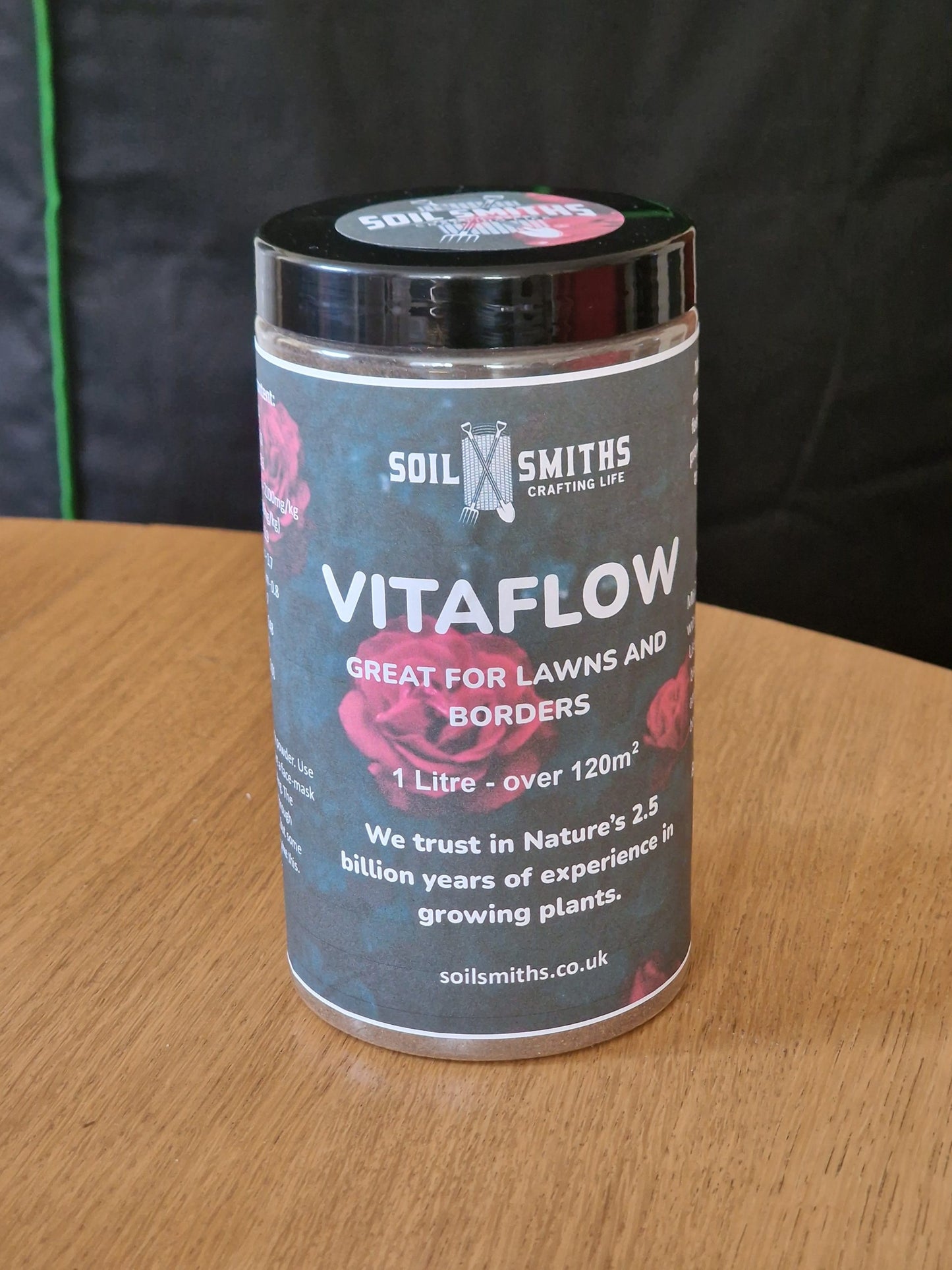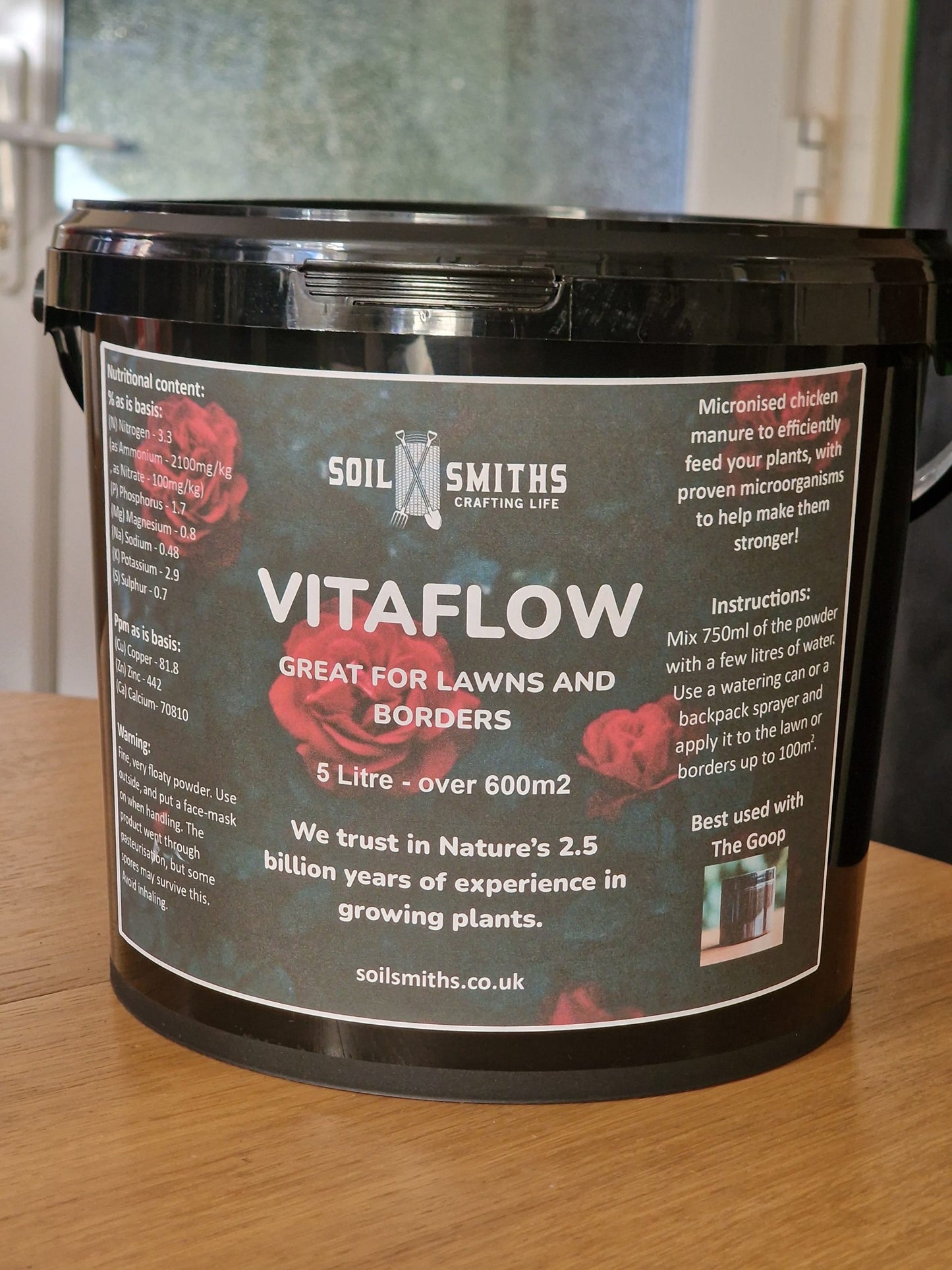Soil Smiths
Soil Smith's "Vitaflow". Micronised Chicken Manure with Beneficial Microbes
Soil Smith's "Vitaflow". Micronised Chicken Manure with Beneficial Microbes
Couldn't load pickup availability
Description
What it is
It’s a micronised, organic based fertiliser derived from chicken manure. It’s a spin on nature’s best plant food, but making it much simpler and easier to use. Also, many organic amendments release their nutrition too slowly, but in this form, your plants will benefit from an almost immediate boost. As it loves water, it was designed to be readily mixed into a suspension either on its own, or best used together with our World-First, the one and only – The Goop.
The nature of the product allows it to be used to feed lawns naturally without the unsightly residue of manure pellets. The dust loves water, and goes into suspension immediately. It can be used in a watering can, or a backpack sprayer with ease.
To increase it’s value further, we have paired it with a host of shelf stable, beneficial microorganisms:
- Eight species of endomycorrhizal fungi. Most terrestrial plants benefit from a symbiosis with these organisms. They effectively increase the volume of soil penetration of your plants by connecting their hyphae with the roots and provide them with water and minerals in exchange for sugars and protein.
- Beneficial bacteria. There is a nitrogen fixer called Azospirillum, another one called Azotobacter, and several species of Bacillus. The former are capable of fixing atmospheric nitrogen when the soil runs low on the food from the manure. The latter can help with making micronutrients from the soil more available to the plants, and also help outcompete pathogens. To top it off there are a couple species of Pseudomonas which help with the decomposition of complex organic matter and also assist in pathogen control. All of these together, additionally can promote plant growth and root development through the production of beneficial plant hormones such as cytokinins and auxins.
- Two species of Trichoderma. These guys can actually attack pathogenic fungi, which gives you another layer of defense against potential disease in your garden and lawn.
- Lastly, apart from coming in the powdered chicken manure, these microbes have been pre-mixed with a lunch bag of humics, carbohydrates, enzymes, yeasts, proteins and algae extract.
Benefits
- Throw away synthetic fertilisers and let nature do its work. Chickens are birds and birds evolved from dinosaurs, so plants had a LOT of time to get used to using this food. The immediately available nutrients stimulate fresh green growth, whilst the organic elements help support soil life before being released to your plants at a later time.
- The added microorganisms help combat pathogens, dig for more nutrients from the soil and stimulate your plants.
- Because it’s a powder which you use as a suspesion in water, it readily infiltrates into the lawn, disappearing without a sight.
Instructions for use
Included is a 100ml measuring scoop. Put a required amount into a watering can or a sprayer. Any sprayer which can handle a particle size of 400 micron or less will suffice. It was designed to be used with The Goop, which helps with making the organic nutrients readily available to your plants, and also helps to deodorise the manure. When used together, there is very little smell after the application, and it soon goes away.
Rates of application
For lawn applications, the recommended rate is 7.5ml / m2 or 750 ml for an average, 100 m2 lawn. At this rate it stimulates the soil life without robbing the lawn of its nutrition. Repeat the application as necessary throughout the year as needed.
Nutritional value
These values may vary depending on the batch of the product, and so need to be used as general guidance. We’ve chosen to publish the lower end of the spectrum here:
% as is basis:
(Ca) Calcium- 7.0
(N) Nitrogen – 3.3
(as Ammonium – 2100mg/kg
, as Nitrate – 100mg/kg)
(K) Potassium – 2.9
(P) Phosphorus – 1.7
(Mg) Magnesium – 0.8
(S) Sulphur – 0.7
(Na) Sodium – 0.48
(Zn) Zinc – 0.04
(Cu) Copper – 0.01
Share




